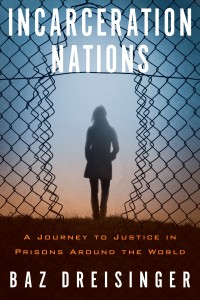Book Review: Incarceration Nations: A Journey to Justice in Prisons Around the World
You do the crime, you do the time.
If you’re willing, in other words, to misbehave or break the law, you need to be willing to face consequences. But what if the crime doesn’t match the punishment? What if your sentence doesn’t have a period at the end? Or what if, as you’ll see in “Incarceration Nations” by Baz Dreisinger, you didn’t commit a crime at all?
As a white Jewish English professor who focuses on African American cultural studies and is passionate about working with about-to-be-released prisoners, Baz Dreisinger says she’s used to surprising people. Her “peculiar blend of identities” is unique – and so was her idea of a two-year journey to visit prisons around the world.
The statistics that spurred her are “devastating:” More than 2 million people are behind bars in America , making the U.S. the “world’s largest jailer.” There are more African Americans in jail today than were enslaved 166 years ago; one in fourteen black men is incarcerated in the States. American prisons hold 160,000 “lifers,” as compared to fewer than sixty lifers in Australia.
America ’s prison model, says Dreisinger, is exported around the world. But the world, as she discovered, altered those plans.
In Rwanda , where violence between Hutus and Tutsis horrified us a generation ago, she discovered that bribery and corruption are “rampant” but prison programs bring criminals and victims together to attempt forgiveness.
In South Africa , in the prison where Nelson Mandela was held, she learned that apologies are nice, but a phone call to a prisoner’s mother does even more.
In Uganda , where overcrowding leads to horrific conditions and corruption is “endemic,” she learns that prisoners are hungry for beauty in words. In Thailand , she toured women’s prisons where guards are required to know women by their names and faces, not their numbers. She visited Australia , which began as a penal colony; Singapore , a “Disneyland with a death penalty” and an exciting reentry program; and Norway , where prisoners can “spend up to half” their sentences off-premises.
When “Incarceration Nations” first crossed my desk, I expected to read horror story after horror story but, surprisingly, that’s not at all what I got. Instead, there’s a lot in here about recidivism, reentry, and forgiveness.
While I suppose one could argue that, in the making of this book, author Baz Dreisinger saw only what officials wanted her to see, there’s much more to this story: Dreisinger was nevertheless still able to draw statistical parallels between American prisons and, say, Singapore’s, where recidivism rates are far less than in the U.S.; or Norway’s, where prisoners are jailed near their home communities. Furthermore, Dreisinger uses her experiences as the founder of the Prison-to-College Pipeline program in New York to show how punishment is more effective if there’s a glint of hope tied up in it.
This is not a soft-on-crime book; instead, it’s more a meditation on making prisons more productive, instead of merely a warehouse for individuals. And if that’s a concern of yours, then “Incarceration Nations” is truly worth your time.





